The past weeks have seen a massive movement erupt in the streets of Colombia, the National Strike against the Tax Reform. Here we publish the recent articles of Colombia Marxista, the Colombian supporters of the IMT, following these developments.
Colombia: National strike – the masses protest Iván Duque’s tax theft
Rosa Espinoza, 2 May 2021
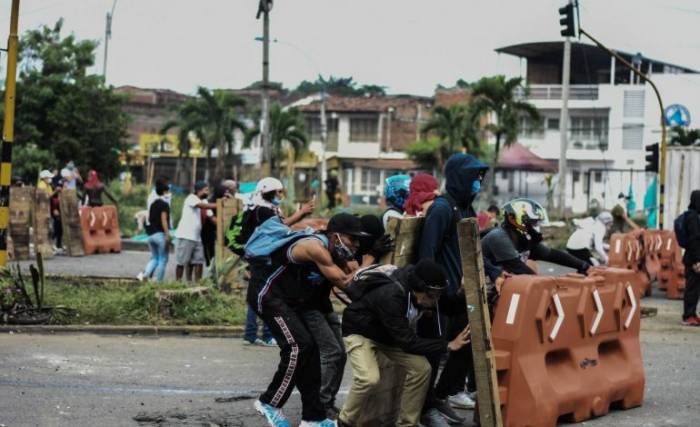
The national strike movement of 21 November 2019 has resurfaced like a revived giant as of 28 April, initiating what is becoming one of the greatest struggles of this period: the National Strike against the Tax Reform. The principle demand arose from exasperation caused by this obnoxious law presented by the Ministry of Finance. But behind it, there runs a deep discontent fomented by a long list of abuses against the ever–more impoverished masses at the hands of the Duque government. With each passing day, the strikers are adding new demands, whether or not they appear on the official list of demands.
Events have unfolded rapidly and have now reached an intense pace of development, with levels of violence increasing with each passing hour, reaching tragic levels, but also awakening an unprecedented level of consciousness among the masses. However, a real solution in the form of a revolutionary programme to help tackle the current crisis is nowhere to be found, much less a strong leadership that unites all organisations under a common goal.
This is giving the movement a disorderly character, weakening it and exposing it to spontaneous and insurrectionary actions, opening a space for opportunists and reformists who at each advance of the strike are attempting to reach an agreement with the bourgeoisie for purely electoral purposes.
Nevertheless, the experiences we are living through will provide lasting lessons. Despite their harsh cruelty, each day has shown the majority their capacity for unity. At the same time, it has revealed to the masses the violence and severity of the Colombian elite – this is nothing less than the true face of capitalism.
Painful lessons
On the first day the atmosphere in the majority of the 23 cities where protests were held was more or less calm. According to the Strike Committee that initiated the movement, hundreds of thousands of people, respecting social distancing, came out to protest against the Tax Reform. The day ended with cacerolazos (pot banging) that was audible everywhere.
However, fear immediately struck the elites, faced with this vigorous show of force from the masses. They soon unleashed their only weapon: repression. So far, according to Human Rights International, 35 civilians have been murdered, 31 persons are missing, 45 human rights defenders have been attacked, and one woman was raped by police officers in the course of the marches.
It is possible that these figures are underestimates, considering that in the city of Cali there were clashes that were used as an excuse to declare a five–day curfew, with the army being called in. Towards the end of 30 April, the army indiscriminately fired rifle rounds at unarmed, peaceful protesters in Cali. As they did so, power was cut in various neighbourhoods. This indicates the degree of planning that the strategy involved. Huge numbers of soldiers arrived at the airport of the capital of Valle del Cauca in time for May Day.
These violent acts of repression have been replicated in other cities, such as Medellín, Bogotá, Neiva, Pereira, Buenaventura, among others. Shots from firearms, the burning of cars, the breaking of house windows, brutal beatings, the use of sports stadia as torture centres, and much else form the long list of their criminal acts. The order was given by Uribe, who took to Twitter to demand that the army and the police be allowed to use their weapons to fire against protesters, whom he classed as vandals. This provocative tweet was deleted and the former president’s account suspended.
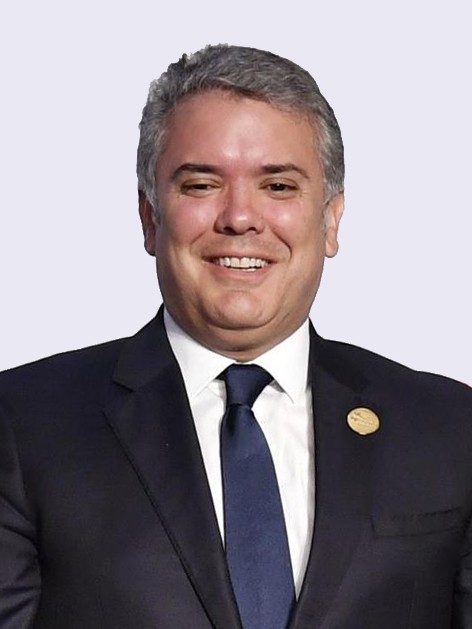
Source: Cancillería del Perú
At the same time, President Duque has acted infamously: ignoring the march and denouncing “acts of vandalism”, while criminalising, threatening and trivialising the protests. His latest act, cornered by the pressure he was facing, has been to announce modifications in the wording of the reform bill concerning points such as VAT on basic goods, gasoline and no longer increasing base income tax.
These are cosmetic changes. There are underlying issues that are more damaging to the (already low) income of workers. The movement is sick and tired of Duque’s methods, and the response has been to radicalise the movement, which is now demanding the total withdrawal of this Tax Reform and the Health Reform, as well as the resignation of the president, or else his overthrow by the masses.
However, such initiative has come directly from the masses in the street. The Strike Committee, and the workers’ unions – such as CUT and FECODE – have on the contrary decided to move the protest online, starting this Friday, calling for a return to the streets in a national stoppage as late as 19 May. They argue that the curfews in place for the third peak of the pandemic demand responsibility with public health. Such a withdrawal under these conditions neither preserves progress made nor does it prepare for future progress. It constitutes an abandonment of the workers in the middle of the fight for fear of confronting the reaction of the Duque–Uribe government.
Without the leadership of the unions or a revolutionary alternative, the Colombian masses can only count on their own energy. While this energy can move mountains, it can only do so with a revolutionary leadership and a socialist programme. Without this, it will be unable to find an expression that can change the conditions that generated it and must dissipate. All that will be achieved is an open confrontation with reaction: a confrontation that reaction is likely to win without much trouble.
We are on the brink of an insurrection of large proportions, a fact felt tangibly by the masses. We have witnessed an awakening among some individuals in the army, and even the police, showing a fracturing in these corrupt institutions. But we must understand that this is only just the beginning. These fractures are comprehensible as these bodies of repression are composed, in their ranks, of members of the working class and the poor peasantry. In many cases, their class backgrounds tend to create sympathy for the cause of the workers, especially when this cause finds a political expression.
How to face the future?
There is still a determination to push ahead. There would seem to be no bridle that can restrain the disobedience of the masses. Although we support this rebellion, we believe it is important that it is underpinned with organisation and theoretical education, otherwise the results may prove as tragic as they have thus far.
Neighbourhood committees should be created to discuss how to conduct self–defence against police abuses and to begin discussing the problems faced in the area, the city and nationally, and to suggest proposals to territorial councils. These must be framed within the democracy of the strike: when a course of action is decided upon through debate and voting, it is maintained until the opportunity for another debate opens. More than this, it is necessary to imbue these organisations with a socialist political programme that can give them a greater purpose than the defence of the movement: the purpose of challenging the Colombian elite for power.
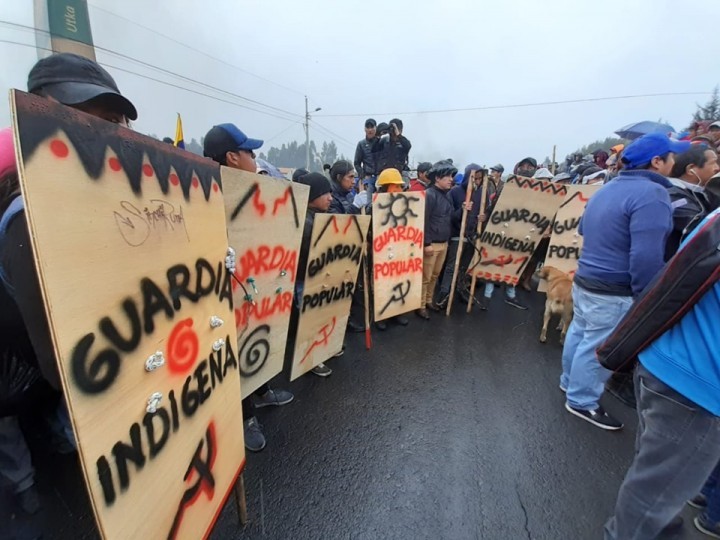
The recent history of Latin America is full of insurrections caused by legislation such as the tax reform. We have seen the Red October in Chile and Ecuador. In both countries, protests caused by austerity bills ended with general strikes that challenged the power of the governments of Sebastian Piñera and Lenin Moreno, respectively. In both cases, people’s guards were created, committees of struggle formed to defend the protesters from the worst the police had to offer and to assist the masses in occupying government buildings. These bodies are the next step, as the trade union bureaucracy has abdicated its leadership role in this fight.
The task of the revolutionaries at this time is clear: to seek the best elements of the Colombian working class with these ideas, and to begin to bring these ideas to the rest of the Colombian working class. Ideas that clarify the reason behind the cruelty of this system and the Duque–Uribe government in particular and how to put an end to the class that this government represents.
Colombia: Mass movement defeats tax reform – now bring Duque down!
Gabriel Galeano – CMI Colombia, 3 May 2021
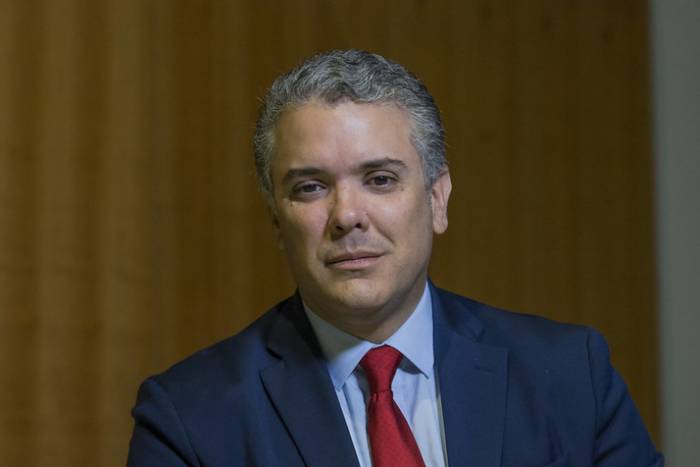
After five days of furious protests across 23 cities in Colombia against Ivan Duque’s tax bill (an austerity package meant to make the workers pay for the results of the pandemic), the government has withdrawn the bill. This is an overwhelming victory for the working class. For five days, more than 50,000 protestors took to the streets of Bogotá (these are official numbers and are probably an underestimation), with the rest of the nation following suit, in protest against a law that would worsen the conditions of daily life.
The energy and sacrifice of the masses cannot be underestimated. In the middle of a third wave of the pandemic, hundreds of thousands of workers risked their lives to bring this austerity package down. Not only this, but they were confronted with the brutality of ESMAD (The Colombian National Riot Police). According to the NGO Temblores, there were more than 900 cases of police brutality reported and 21 people killed by the police.
Videos on Twitter showed ESMAD officers celebrating after each shot fired from their tanks against the protesting masses. On 30 April, when the scale of the repression in Cali emerged, images circulated on social media of a man shot in the head and bleeding on the streets. This is what the working class were up against and what they have resoundingly defeated. This victory was won with the sacrifice and the energy of the working class.
That Colombian debt in circulation is considered junk due to the huge fiscal deficit – amounting to 9% of GDP – certainly helped bring down the bill. The mass unrest made it possible that the bill might fail to get the necessary votes in Congress. Failure to pass the bill could have ended in Colombian debt being downgraded. This was a factor in pushing Duque to drop the bill so that a new one might be drafted based on a ‘consensus’ in Congress.
This places the government in a clear crossroads: Who pays for the crisis? They tried to ensure the working class paid for the crisis through taxes and austerity, but they were unable to do so. However, they will have to keep trying as they have no other alternative.
We’re now beginning to see splits open up in the ruling class regarding this question, with one side arguing for temporary tax increases for the rich. But as was pointed out by Luis Carlos Reyes, the director of the Fiscal Observatory of the Xavieran University, “the President announced that the consensus between the parties and the entrepreneurial lobbies includes temporary taxes on patrimonies, earnings, and businesses. We must postpone (but not renounce) the transfer onto the workers and consumers those taxes which were cut for businesses in 2018.” (Our emphasis)
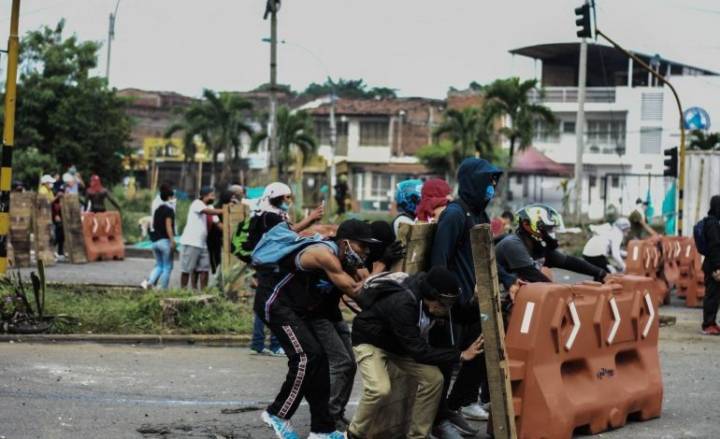
The Duque government’s attempt to militarize the cities that saw uprisings was also regarded as a provocation by the cities’ mayors. In Bogotá, Claudia López refused to accept the presence of the army, while cheering on the capacity of the police in “maintaining peace”. In Cali, the mayor Jorge Iván Ospina asked Duque to withdraw the tax bill, while at the same time using heavy repression against protesters and denying that any had been killed.
It’s clear that the ruling class can no longer rule in the way they have ruled for years: with the tactics of repression and exploitation for the sake of imperialist profits. The Duque government had to clearly concede that it could not implement this tax bill. Even the international bourgeoisie couldn’t see a road forward for the Colombian ruling class as long as they insisted upon it. To continue on this course, with the working class quickly learning how to fight and win, would have been pure folly. In these circumstances, it was imperative for the government to offer a concession to remove the masses from the streets.
Significantly, however, the main slogan of today’s protests has been #ElParoNoPara (The Strike Doesn’t Stop). This is a correct slogan, which reveals the mood of the masses. A victory like this should serve to strengthen the resolve of the movement to continue advancing with further demands.
Iván Duque’s government has shown its true face for the last two years. This is the government of Álvaro Uribe Vélez, with all the cruelty that defines the former president, known as El Matarife (The Butcher). Duque’s handling of the pandemic, with its so–called ‘smart reopening’ and this recent tax bill, are policies of an elite used to having its way by means of their rifles and our blood. Today they were answered with a thunderous, “no!”
We have to take “The Strike Doesn’t Stop” to its natural conclusion: Duque Out. It’s clear that this government has no other option beyond implementing austerity measures to satisfy the international bourgeoisie. The next move for the government will probably be the implementation of Law 010, for instance. This is an attempt to reduce the number of health insurance companies to ten, effectively monopolising the healthcare sector, which will lead to the worst forms of barbarism in the name of “reducing inefficiencies”. It is clear that until this government has been brought down, it will forever seek new ways to attack the working class.
Throughout all of this the shortsightedness of the trade union leaders has been noteworthy. The unions that called for the strike (CUT, United Workers Central, and FECODE, teachers’ union), after the first day of protests on 28 April called on everyone to go return home, using the pandemic as an excuse. On May Day they called for an online protest. But the masses remained on the streets. For the last four days, the men and women on the streets have not been the trade union leaders, who were pushed into calling the national strike by pressure from the rank and file.
The protestors on the streets were the workers, unwilling to bend the knee in the face of injustice, and the youth who have been radicalised through the years of repressive governments. It’s also worth mentioning that reformists like Gustavo Petro were silent from 28 April until the day the bill was withdrawn. Mayor of Bogotá, Claudia López, on the other hand, commended her policemen for protecting the streets of the city.
Colombian history has few moments like these, in which the masses have openly challenged a government and have won. The masses are learning exactly how powerful they are. This is a victory for all those who came out onto the street and those who supported them but were unable to be on the streets because of the risks of the pandemic.
This period has seen the organisation of neighbourhood committees of struggle along the lines of those seen during the general strike of November 2019. We must develop upon this in order to continue the strike and the struggle: we must demand an end to Duque’s government and put forward the need for an independent workers’ party that can link the different struggles with the overarching goal of overthrowing the class behind this repression and these attacks.
From Colombia Marxista, we celebrate this victory as a rejection of the common myth about the masses of our country: that they are an embodiment of passivity and will never rebel. The potential of our working class has been demonstrated. Our task is clear: we must bring the ideas of Marxism to a movement that clearly has the energy to put them in effect while contributing our own energy to the cause so that a coup de grace might be dealt to this murderous government.
We must also ask ourselves: what comes next? We must not allow Duque’s overthrow to mean his replacement by another representative of the oligarchy. A socialist government is necessary, in which the working class runs society and takes the reins of its own destiny. We do not struggle for governments to work but for workers to govern.
OUT WITH THE DUQUE–URIBE GOVERNMENT AND THE CLASS IT REPRESENTS!
THE STRIKE DOESN’T STOP!
NO TO AUSTERITY!
FOR A WORKERS’ PARTY!
Colombia: Day 6 of the national strike – Down with Duque!
Colombia Marxista, 5 May 2021
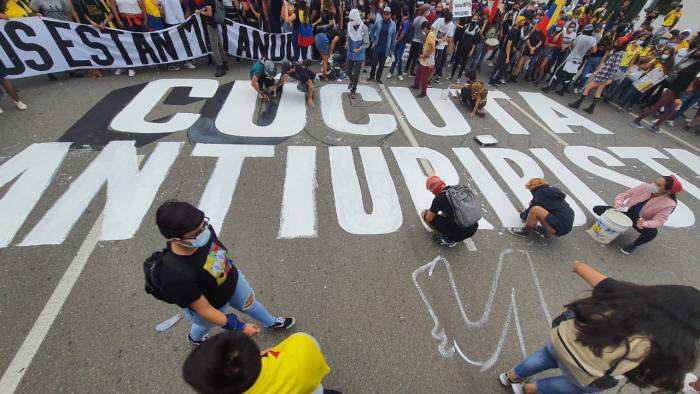
Yesterday, on 3 May, Alberto Carrasquilla, the main proponent of the Tax Reform, exited through the back door, resigning with Vice Ministers Juan Alberto Londoño (Finance) and Juan Pablo Zárate (Treasury). The pressure from the national strike – which has now gone on for six days – and the total bankruptcy of the Duque-Uribe government, have put these pen-pushing officials to the test. In underestimating the power of the masses, they have been utterly scorched by it.
The departure of this representative of the Colombian elite is not to be taken lightly. This is a severe blow to the economic aspirations of the national bourgeoisie. On 6 April, 2020, Carrasquilla was nominated to preside over the multilateral bank CAF (Development Bank of Latin America), now the situation is complicated by his absence. Humiliated on an international level, he will likely be removed from his “pedestal” for his incompetent handling of events.
In less than 24 hours the masses have had two important victories, thereby demonstrating their strength. The power of the movement continues to grow, with more and more joining in the struggle. It has reached the large cities and towns, with addition of the transport union, taxi drivers, and other organisations with a long history of class struggle such as CRIC (Regional Indigenous Council of Cauca). With the incredible popularity of its slogans, this movement continues to grow further.
However, if in defeat nobody assumes the blame, in victory everyone accepts the glory. In this way the bureaucracies of the workers’ councils, the Committee of the Unemployed, and other opportunists from the left and centre have emerged. They are celebrating the victory as their own in order to regain leadership over the masses. Their ‘victory’ does not correspond to the reality of events. It is the masses on the streets who have won on their own initiative, coming to their own conclusions from facing the brutality of the regime. They have learned through struggle their power and capacity for resistance, thereby increasing their demands.
The boldness of these demands can be seen clearly in their range. From a repeal of the Health Reform bill of 2010 to the imprisonment of Carrasquilla; the dissolution of the ESMAD (Mobile Anti-Disturbance Squadron); police reform; the resignation of Carlos Camargo, ‘Public Defender’ (who strolls around whilst brutal repression is carried out upon the masses); the resignation of the Minister of Defence, Diego Molano; and finally, the resignation of Ivan Duque, President of the Republic.
These demands sharply contrast with the proposals from the National Committee of Unemployment, which shifted its idea of resuming demonstrations on 19 March to 5 May, calling for the demilitarisation of the cities, the withdrawal of the Health Reform Bill, advocacy of a Living Wage, and other similar demands. All of which are necessary, but which are far from what has already been achieved on the streets as a direct confrontation to the status quo. To say that the leadership here is lagging far behind the movement is an understatement.
The demand for Duque’s resignation makes sense as the current administration finds itself walking on a tightrope. Furthermore, decision after decision have seen their attempts to halt the strike fail. In fact, they have accomplished the opposite. It seems the only tool the Colombian elite has is its repressive apparatus, a tool that has been used exhaustively. Threats to stop vaccination, or lower foreign investment, hunger and violence are empty. That’s all part of the daily life of the average Colombian.
The incompetence of the ruling class has undeniably resulted in a massacre, the consequences of ruthless repression. For instance, when the masses decided on 2 May to continue the strike, they received a night of terror in response. Cities such as Palmira, Ibagué, Cali, Popayán, Facatativá, Bogotá and Medellín were victims of ESMAD’s reprisals. They kidnapped and beat protestors, they forcefully entered homes, threatened the human rights of officials, and raped and murdered in cold blood.
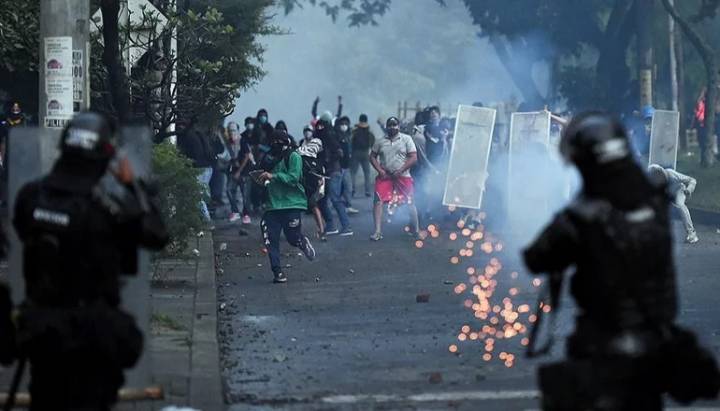
According to Temblores ONG, 5 were murdered by the end of 2 May, now it’s a total of 26 in addition to the repressions of the previous days. Furthermore, they report that since 28 April there have been 1,181 cases of police violence, 142 victims of physical violence and 9 victims of sexual violence. It is horror without end, which seems to only be increasing. Appearing in the most belligerent places, they prevent people from supplying aid or from mobilising. In Cali, General Enrique Zapateiro took over command, and unleashed a massacre upon civilians.
However, as stated above, this is the only weapon they have in their arsenal, and it is an exhaustible and unreliable resource. These six days have made a dent in the public forces, that day after day succumb to multiple injuries. Indeed, resorting to the army was a necessity to make up for its lack of strength. Yet, the soldiers are fickle in light of their humble origins and lack of professionalism, and many are prone to fraternisation with the people. In fact, there have already been calls from retired military personnel and those of the reserves to side with the demonstrators. Even then, it is important to emphasise that the military is still the repressive arm of the state and serves its masters obediently.
The working class has begun to feel great confidence in its own strength and has used this strength to face off against the worst horrors imaginable. There is no doubt that this is the correct path, and it must be followed until the end. The natural conclusion should be this: The fall of Duque and the government, on account of its own ineptitude, cynicism, and inefficiency.
Any law that threatens the working class, in the present or in the future, must be a cause for rebellion and mobilisation of the masses. However, although victories may be won, if the movement becomes weak at any point it risks losing what it has already won. For this, it is necessary that a revolutionary organisation be formed. An organisation which understands the interests of the masses, and can transform this into a political programme capable of responding to, for instance, a possible vacuum in government. Furthermore, this programme must be based on nothing more than the ideas of Marxism, in order to lead the masses to socialism.
If anything has become clear in these last few days, it is that bourgeois democracy is in the service of the ruling class. The laws it changes are of little value if they are the subject of that very same democracy. As long as the commanding levers of the economy are in the hands of the capitalist elites, any and all reform and regulation will be in the service of their interests.
A great challenge lies in front of us, but it is one that our movement and experiences can confront in struggle. It is undeniable that progress has been made, and certainly more can be done. Yet, if there is no discussion organised around the ideas of the movement and its objectives there is a great chance that it may lose its strength and momentum given the real limitations of these mobilisations. This would represent a great defeat that surely would result in the doubling down of repression.
The awakening of a people is extraordinary. In a week it has achieved and advanced more than what has been done in years. Revolutionary awakening is also magnificent, but its energy can diffuse in an instant. Moreso if it suffers from strategic confusion and is constantly suffering setbacks. Our organisation applauds the rebellion of the Colombian working class and its determination in this struggle. But we insist on the need to form neighbourhood defence committees and discuss strategies on how to defend oneself from police abuses, as well as discuss the practical problems of the neighbourhoods, the cities, and the country, and to form regional councils along the same foundations. Likewise, from this foundation, sure and quick solutions may be discussed in the event that a possible vacuum of power presents itself. It may determine a political programme which, on the basis of a socialist plan and programme, provides an even greater purpose than the defence of the movement: a challenge to the Colombian elite for power.
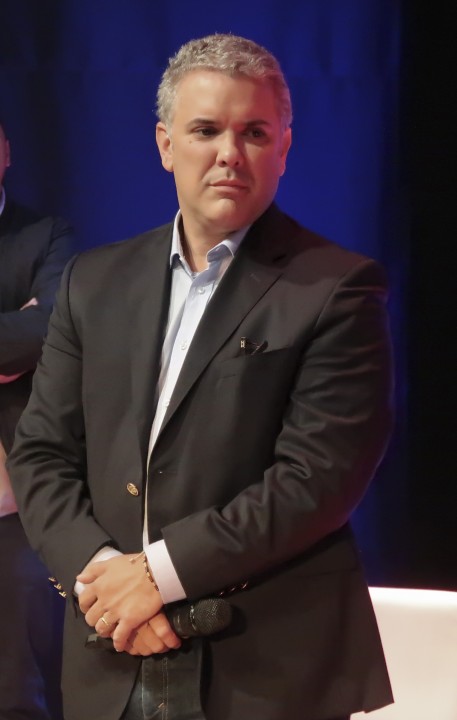
The road to change has been paved by the youth, the peasants, and the working class. It is a difficult road that will require many sacrifices and mistakes will be made. However, every historical task necessitates a first step; and it is indeed a difficult one. Yet, when taken, events will unfold with their own logic. The tasks of Marxists in this period is to put our theory and study of history and society at the service of the working class and its movement, to bring down this government and the class it represents. It is a good thing, then, that we have already started.
We present our programme and proposal that we submit to criticism. That is why we invite you to discuss them with neighbours and friends.
No end to the Strike!
Out with Duque and the class he represents!
For a united party of the working class!
TO THE WORKERS AND YOUTH OF COLOMBIA:
Iván Duque and his boss Álvaro “The Butcher” Uribe have declared war on the workers and youth in a genuine criminal collusion with the capitalist class. The cowardice and clumsiness with which they act are evidence of a force that, not wanting to accept defeat, is threatening all its arsenal. But this arsenal is limited and, although defenceless, we overwhelm them in numbers and morale. They have the training of bluster and ruthlessness, we have the training of work. It is essential to maintain the offensive when the regime has shown that shedding the blood of honest people is the only thing that makes them think they are brave.
The national strike must go on. Every single person who has fallen fighting has said goodbye to us with that hope. Overthrowing the government is the best tribute we can pay them and the best legacy we can give to the new generations.
The experience of 2019 showed us that the assemblies and committees that we can organise in our neighbourhoods are more effective and provide better solutions in a couple of meetings than a century of congressional sessions. We need to return to those spaces, meet to assess the situation, propose solutions and discuss them among the different groups. In this way, we will be able to build a solid programme and identify leaderships. In this sense, we put forward our programme for your consideration.
The different workers’ initiatives should convene a Popular Emergency Meeting, composed of delegates elected in the neighbourhood assemblies to give the struggle an organised and democratic character. In this meeting the urgent questions should be raised and how to achieve them: the dismantling of the ESMAD, the trial and punishment of those responsible for the repression, the organisation of pickets to defend the demonstrations, the end of the 010 Law that will enslave the health workers and reduce them to commodities, and the repudiation of the payment of the foreign debt.
The honour of the Colombian soldiers, sons of the working and peasant people, cannot be stained by obeying criminals like Eduardo Zapateiro and Álvaro “The Butcher” Uribe. We invite you to join the struggle against the government, on the side of your own people, of those of us who know what it is to go through want and hardship.
We, the workers, must not pay for this crisis. It will be the rich, those who have been turning our sweat and blood into luxurious private parties, who will have to pay for all this. On the ruins of their decadence we, the workers, will be able to build a paradise on earth on this fertile and diverse piece of the world.
The Strike does not Stop – Assemblies and Committees to strengthen the struggle – National Emergency Meeting to give it leadership – Down with Duque – Let the workers rule!

